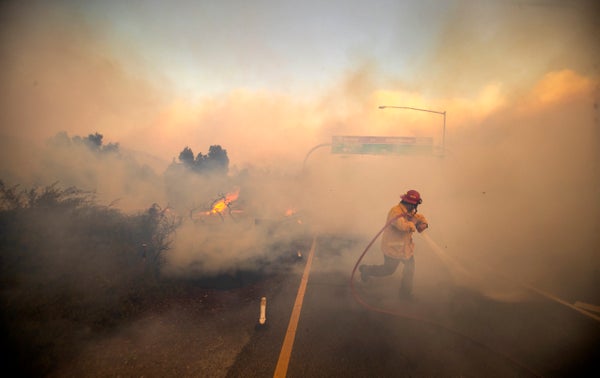November 26, 2024
3 min read
Wildfire Smoke Linked to Increased Risk of Dementia
The particles that make up wildfire smoke may raise the risk of dementia even more than similar airborne pollutants from other sources

A firefighter is surrounded by heavy smoke as he battles the advancing Silverado Fire fueled by Santa Ana winds at the 241 toll road and Portola Parkway on October 26, 2020 in Irvine, California.
Allen J. Schaben/Los Angeles Times via Getty Images
CLIMATEWIRE | Wildfire smoke can aggravate a variety of medical conditions, from asthma to heart disease.
Now, new research adds another worry to the mix. It can elevate the risk of dementia.
A study published Monday in the scientific journal JAMA Neurology, finds that long-term exposure to smoke concentrations is associated with a higher risk of dementia diagnosis over time. For every one microgram increase in wildfire pollution per cubic meter of air over the course of a three-year period, the odds of dementia diagnosis rise by about 18 percent, the study finds.
On supporting science journalism
If you’re enjoying this article, consider supporting our award-winning journalism by subscribing. By purchasing a subscription you are helping to ensure the future of impactful stories about the discoveries and ideas shaping our world today.
That’s compared with each person’s baseline risk of dementia diagnosis, which remains relatively low among the general population. Still, the increased risks are large enough to pose a public health concern.
The study focuses on a form of air pollution known as particulate matter — tiny, inhalable particles, with diameters of 2.5 micrometers or smaller. This kind of air pollution can originate from a variety of sources, including automobiles, industrial sources and fires.
Previous studies already have suggested that particulate matter can increase the risk of dementia, among other health problems. The new research zooms in specifically on particles produced by wildfire smoke, which can have different chemical and physical properties than particles produced by other sources.
The study examined medical records from more than 1 million people in Southern California from 2008 to 2019, all part of the Kaiser Permanente Southern California medical care consortium. It also analyzed air quality records from the same time period to estimate long-term pollution concentrations, including particles stemming directly from wildfire smoke.
The study found that wildfire smoke increases the risk of dementia significantly more than particulate matter from other sources. There are several reasons that could be the case, the researchers say.
Wildfire smoke particles tend to have higher concentrations of molecules known for toxic or inflammatory properties. And wildfire smoke tends to spike at certain times of the year, compared with other kinds of air pollution — intermittently exposing communities to extremely high pollution concentrations, which may have greater effects on their health.
The study also found that certain demographics are at higher risk than others, including people with lower incomes and people of color, including Black, Hispanic and Asian communities.
Low-income communities often are at higher risk of exposure to air pollution, the researchers note. Lower quality housing in these communities may allow particulate matter to infiltrate homes more easily, and residents may have less access to air filtration systems.
Marginalized groups also may contend with more health challenges, in part because of systemic discrimination, compounding their risks of developing dementia later in life.
“We know that climate change impacts the most vulnerable communities first and worst and we appear to see a similar signal in our data,” said Joan Casey, an environmental epidemiologist and co-author of the new study, in an email to POLITICO’S E&E News.
Policymakers can take certain steps to protect these vulnerable communities, she added. They can make sure that all communications about public health are issued in multiple languages. And they can push for policies aimed at combating climate change, reducing other sources of air pollution and mitigating wildfires through strategies such as science-based controlled burns.
Meanwhile, there are other questions that scientists can examine in future research.
The new study looked at dementia of all kinds. But future studies can investigate whether certain types of conditions, such as Alzheimer’s disease, have stronger ties to wildfire smoke than others.
The research team is also “very curious” about the effects of multiple climate hazards working together, Casey added. If wildfires happen to coincide with power outages, for instance, that could restrict the ability of many households to use air filtration systems — potentially worsening their health risks.
These kinds of questions are growing more urgent as the effects of climate change worsen. Recent research has found that about a quarter of all particulate matter pollution in the United States comes from wildfire smoke. And in parts of the Western U.S., smoke is responsible for as much as half.
Reprinted from E&E News with permission from POLITICO, LLC. Copyright 2024. E&E News provides essential news for energy and environment professionals.
